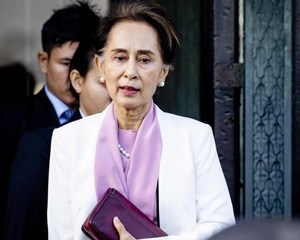All too swiftly came the fall. Suu Kyi's defense of the military over 2017 atrocities committed against the Rohingya—a mostly Muslim minority in western Myanmar—made her an object of global scorn. U.N. investigators determined that the Tatmadaw's campaign of arson, rape and murder had "genocidal intent." Suu Kyi rejected the accusations, defending Myanmar against charges of genocide at the Hague in 2019.
倒臺來得太快了。昂山素季在2017年對緬甸西部羅興亞人(主要是穆斯林)犯下的暴行為軍方辯護,這使她成為全球嘲笑的對象。聯合國調查人員認定,緬甸軍隊的縱火、強奸和謀殺行動具有“種族滅絕的意圖”。昂山素季否認了這些指控,并于2019年在海牙為緬甸的種族滅絕罪辯護。
To those in the outside world who once deified her, it was a breathtaking betrayal. Amnesty International had bestowed its highest honor on her, but revoked it in 2018 in light of her "shameful betrayal of the values she once stood for." The portrait of her that once hung at her alma mater Oxford University was mothballed.
對于外界那些曾經神化她的人來說,這是一種不可思議的背叛。大赦國際曾授予她最高榮譽,但在2018年撤銷了這一榮譽,因為她“可恥地背叛了她曾經代表的價值觀”。她那曾掛在母校牛津大學的肖像也被封存。
Wai Wai Nu, a Rohingya activist living in the U.S., says that in the eyes of the country's more than 100 ethnic minorities, Suu Kyi's defense of the military separated her from the quest for democracy. "We felt betrayed," she says. If they oppose the coup, it's not because they have changed their position on Suu Kyi. "We are standing up for what is right for the country."
薇薇努,一位生活在美國的羅興亞活動家,說在這個國家超過100個少數民族的眼中,昂山素季對軍隊的保護使她與民主的追求分離開來。“我們感到被背叛了,”她說。如果他們反對政變,那并不是因為他們改變了對昂山素季的立場。“我們在為國家的正義挺身而出。”

But Suu Kyi remains enormously popular in Myanmar. On Feb. 2, many Yangon residents stood at their windows banging on pots and pans, some chanting, "Long live mother Aung San Suu Kyi!" There are signs of popular resistance internally, with reports that doctors and nurses are refusing to work in protest. Some longtime Myanmar watchers say no one should be writing off Suu Kyi just yet. Even behind bars she would be "one of the most powerful people in the country," says Mark Farmaner, director of human rights advocacy group Burma Campaign U.K.
但是昂山素季在緬甸仍然非常受歡迎。2月2日,許多仰光居民站在窗戶前敲著鍋碗瓢盆,一些人高喊著,“昂山素季母親萬歲!”有跡象表明國內出現了民眾的抵抗,有報道稱醫生和護士拒絕工作以示抗議。一些長期觀察緬甸局勢的人士說,目前還沒有人應該把昂山素季排除在外。即便身陷囹圄,她也會成為“這個國家最有權勢的人之一,”人權倡導組織緬甸運動英國主任馬克·法曼納說。
Yet ongoing COVID-19 restrictions make mass protests unlikely, and fear of reprisal is well justified; thousands were arrested and as many as 200 killed during 2007 demonstrations, according to advocacy groups. "There isn't really (any protest going on here)," says Ye Yint Thu, a university student who lives on the Thai border. "I want to participate, but if I do it alone, I might be arrested."
然而,因目前仍在實施冠相關限制措施,發生大規模抗議的可能性極小,害怕報復是有道理的。據宣傳組織說,在2007年的示威活動中,有數千人被捕,多達200人被殺。“這里真的沒有發生(任何抗議活動),”住在泰國邊境的大學生葉因圖說。“我想參加,但如果我一個人去,可能會被逮捕。”
There are also signs that a return to military rule has been a dose of reality for those hoping for democracy. Youth activist Thinzar Shunlei Yi says he and others are tired of the "personality cult" of Suu Kyi. "We want a real democracy led by real people." Kyaw Kyaw, the LGBTQ-rights campaigner, adds that Suu Kyi's latest imprisonment has been a wake-up call: "A lesson learned is we should not depend on a person. We should depend on a political structure."
也有跡象表明恢復軍事統治對那些希望民主的人來說是一劑現實的良藥。青年活動人士Thinzar Shunlei Yi說,他和其他人已經厭倦了對昂山素季的“個人崇拜”。“我們想要一個由真正的人民領導的真正的民主。”LGBTQ(性少數群體)權利活動家覺覺補充說,昂山素季最近的入獄事件是一個警鐘:“我們得到的教訓是,我們不應該依靠一個人,我們應該依靠政治結構。”
譯文由可可原創,僅供學習交流使用,未經許可請勿轉載。












